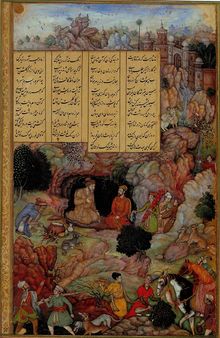Amir Khusrau | |
|---|---|
 Amir Khusrow teaching his disciples in a miniature from a manuscript of Majlis al-Ushaq by Sultan Husayn Bayqara | |
| Background information | |
| Birth name | Ab'ul Hasan Yamīn ud-Dīn K͟husrau |
| Born | 1253 Patiyali, Delhi Sultanate (now in Uttar Pradesh, India) |
| Died | October 1325 (aged 71–72) Delhi, Delhi Sultanate (now in Delhi, India) |
| Genres | Ghazal, Qawwali, Ruba'i, Tarana |
| Occupation(s) | Sufi, singer, poet, composer, author, scholar |
| Influenced by Sufi saint Nizamuddin Auliya | |
Abu'l Hasan Yamīn ud-Dīn Khusrau (1253 – 1325 AD), better known as Amīr Khusrau, sometimes spelled as, Amir Khusrow or Amir Khusro, was an Indo-Persian[1] Sufi singer, musician, poet and scholar, who lived during the period of the Delhi Sultanate.
He is an iconic figure in the cultural history of the Indian subcontinent. He was a mystic and a spiritual disciple of Nizamuddin Auliya of Delhi, India. He wrote poetry primarily in Persian, but also in Hindavi. A vocabulary in verse, the Ḳhāliq Bārī, containing Arabic, Persian and Hindavi terms is often attributed to him. Khusrau is sometimes referred to as the "voice of India" or "Parrot of India" (Tuti-e-Hind).
| Part of a series on Islam Sufism |
|---|
 |
|
|
Khusrau is regarded as the "father of qawwali" (a devotional form of singing of the Sufis in the Indian subcontinent), and introduced the ghazal style of song into India, both of which still exist widely in India and Pakistan.[2][3] Khusrau was an expert in many styles of Persian poetry which were developed in medieval Persia, from Khāqānī's qasidas to Nizami's khamsa. He used 11 metrical schemes with 35 distinct divisions. He wrote in many verse forms including ghazal, masnavi, qata, rubai, do-baiti and tarkib-band. His contribution to the development of the ghazal was significant.[4]

- ^ Sharma 2017.
- ^ Latif 1979, p. 334.
- ^ Powers & Qureshi 1989, pp. 702–705.
- ^ Schimmel, A. "Amīr Ḵosrow Dehlavī". Encyclopaedia Iranica. Eisenbrauns Inc. Archived from the original on 17 May 2016. Retrieved 30 December 2023.